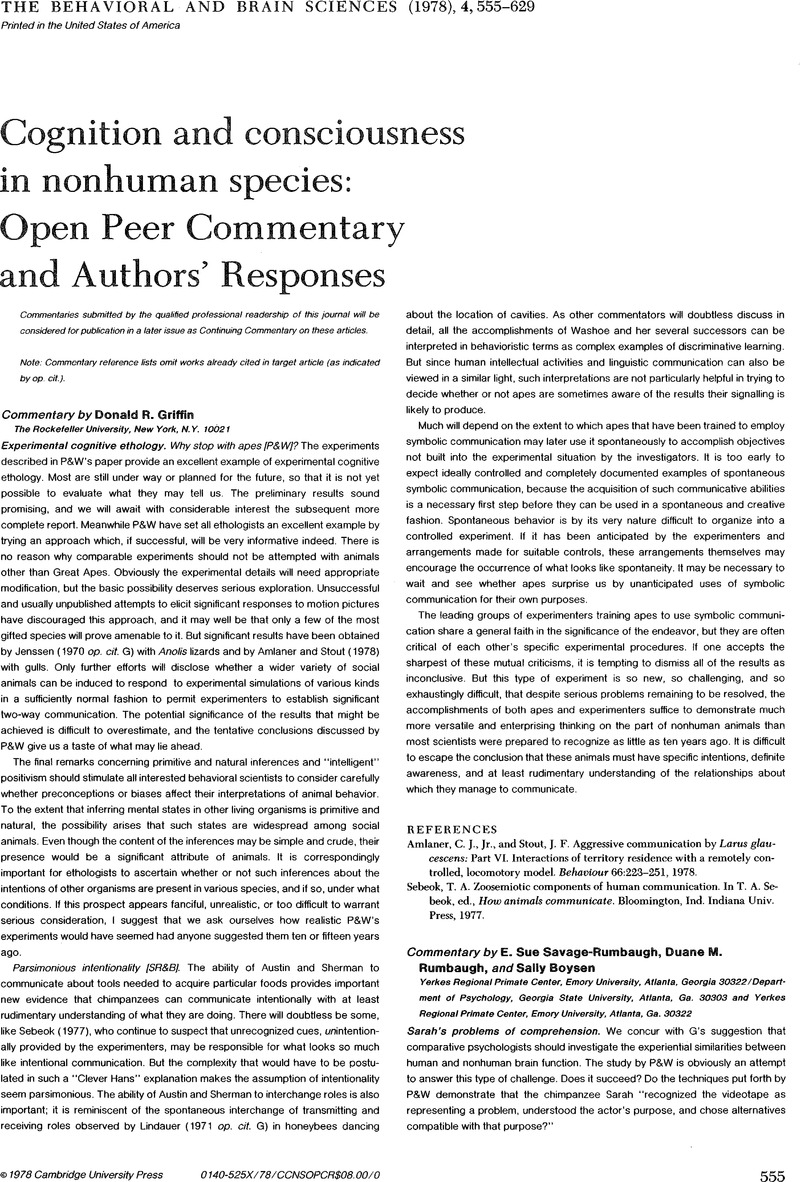Crossref Citations
This article has been cited by the following publications. This list is generated based on data provided by Crossref.
Davis, Lawrence H.
1989.
Self‐consciousness in Chimps and Pigeons.
Philosophical Psychology,
Vol. 2,
Issue. 3,
p.
249.
Lubinski, David
and
Thompson, Travis
1993.
Species and individual differences in communication based on private states.
Behavioral and Brain Sciences,
Vol. 16,
Issue. 4,
p.
627.
Hineline, Philip N.
1993.
A promissory note is paid, but has this bought into an illusion?.
Behavioral and Brain Sciences,
Vol. 16,
Issue. 4,
p.
650.
Branch, Marc N.
1993.
The outside route to the inside story.
Behavioral and Brain Sciences,
Vol. 16,
Issue. 4,
p.
644.
Bringsjord, Selmer
and
Bringsjord, Elizabeth
1993.
Animal communication of private states does not illuminate the human case.
Behavioral and Brain Sciences,
Vol. 16,
Issue. 4,
p.
645.
Baum, William M.
1993.
The status of private events in behavior analysis.
Behavioral and Brain Sciences,
Vol. 16,
Issue. 4,
p.
644.
Mitchell, Robert W.
1993.
Pigeons as communicators and thinkers:Mon oncle d'Amerique deux?.
Behavioral and Brain Sciences,
Vol. 16,
Issue. 4,
p.
655.
Bamberg, Michael
1993.
Communication and internal states: What is their relationship?.
Behavioral and Brain Sciences,
Vol. 16,
Issue. 4,
p.
643.
Davis, Lawrence H.
1993.
No report; no feeling.
Behavioral and Brain Sciences,
Vol. 16,
Issue. 4,
p.
647.
Laakso, Aarre
1993.
Pigeons and the problem of other minds.
Behavioral and Brain Sciences,
Vol. 16,
Issue. 4,
p.
652.
Moore, Chris
1993.
The role of convention in the communication of private events.
Behavioral and Brain Sciences,
Vol. 16,
Issue. 4,
p.
656.
Baer, Donald M.
1993.
Perhaps Sisyphus is the relevant model for animal-language researchers.
Behavioral and Brain Sciences,
Vol. 16,
Issue. 4,
p.
642.
Mortensen, Chris
1993.
Private states and animal communication.
Behavioral and Brain Sciences,
Vol. 16,
Issue. 4,
p.
658.
Moore, Jay
1993.
Behaviorism, introspection and the mind's I.
Behavioral and Brain Sciences,
Vol. 16,
Issue. 4,
p.
657.
Zuriff, G. E.
1993.
What's the stimulus?.
Behavioral and Brain Sciences,
Vol. 16,
Issue. 4,
p.
664.
Pepperberg, Irene M.
1993.
Communicative acts and drug-induced feelings.
Behavioral and Brain Sciences,
Vol. 16,
Issue. 4,
p.
659.
Thompson, Nicholas S.
1993.
Are some mental states public events?.
Behavioral and Brain Sciences,
Vol. 16,
Issue. 4,
p.
662.
Hocutt, Max
1993.
Difference without discontinuity.
Behavioral and Brain Sciences,
Vol. 16,
Issue. 4,
p.
651.
Humphreys, Lloyd G.
1993.
Behaviorism is alive and well.
Behavioral and Brain Sciences,
Vol. 16,
Issue. 4,
p.
651.
Zentall, Thomas R.
1993.
The assessment of intentionality in animals.
Behavioral and Brain Sciences,
Vol. 16,
Issue. 4,
p.
663.


